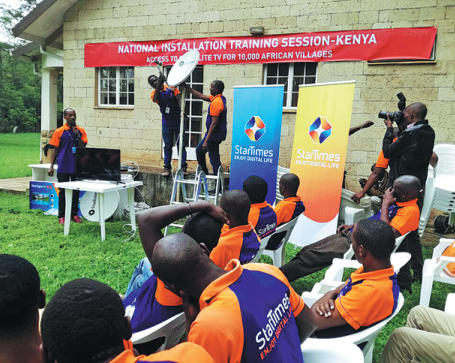Battling mud and the wind, bearers of technology are greeted like VIPs
By Wang Xiaodong | China Daily | Updated: 2021-11-22 07:01

We started to install satellite TV for villagers in Kenya in early 2017, and by the end of the year the project, covering 800 villages across the country, was almost completed.
In each of the villages we installed satellite TV free of charge for 20 households, including providing them with equipment such as satellite dishes and set-top boxes. In addition, we provided two solar-powered projectors and two digital televisions to each of the villages for public use.
A challenging part of the work was to communicate with various parties before the installation, including jointly selecting villages with Kenyan officials and inspecting villages. At first, some village chiefs were dubious when we told them of our plans. In addition to the village chief, it was very useful to talk to the most senior person, someone revered among villagers, to make our intentions clear.
Working conditions in villages were usually very poor, a major obstacle being poor transport. Most villages had only a mud road, many so narrow and windy that they were not usable by cars.
It was also common to see cars sunk into roads and unable to move. So sometimes we had to resort to other transport such as horses to carry the satellite TV equipment for installation. In flooding seasons, boats were needed.
Another big challenge was security. In some parts of Kenya, especially near the border with Somalia, conflict and terrorist attacks were not uncommon. Near some villages selected for satellite TV installation there were land mines left during war, so we had to be escorted by local police.
Despite the difficulties, we felt our work was meaningful and valuable, and were deeply touched by the villagers' friendship and trust.
In Kenya, one of the most unforgettable visits for me was to a Maasai tribe village. The moment I got out of the vehicle I was surrounded by villagers. That reception took me by surprise, and I later realized everyone in the village, at least 100 people, had come out to welcome me after having heard we were going to install satellite TV.
The village chief and an elder received me, and many villagers danced in a festive mood. They got me to sign my name in a book, reserved for only significant events in the village, and I was very flattered. They also slaughtered a goat for a banquet for me and my two colleagues, treating us like VIPs.
I was particularly touched by the villagers' dancing. They moved so naturally and merrily, seeming to reflect their deepest feelings.
For Chinese like me in Africa, who usually stay in big cities such as Nairobi, it was difficult to realize how strong the desire was for new things from people living in villages. In some villages I visited, they had never seen a projector, and big crowds gathered around a television set, which reminded me of what it was like in many places in China many years ago.
Over the past few decades Chinese companies have built a lot of infrastructure such as bridges, roads and railways in Africa. I believe more cultural and people-to-people exchange programs will also be carried out in Africa to help improve people's lives.
Zhang Junqi spoke with Wang Xiaodong.
























